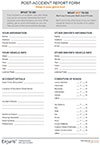Second-worst state in the country for distracted driving car accidents after Louisiana
If you're texting while driving, you are not looking at the road.
By the way, do you know how long it takes even a focused driver going 55 miles per hour to come to a complete stop?
Almost the length of a football field.
If there were a person in front of your car and you weren't paying attention, do you think you'd stop in time?
Would you bet that person's life on it?
Distracted driving statistics
Florida is the second-worst state in the country after Louisiana for distracted driving. This is likely because talking on a cellphone is a secondary offense for which police cannot pull you over; drivers must be committing some larger offense.
Florida is only one of five states for which texting while driving is a secondary offense.
Meanwhile, there were more than 45,000 distracted driving crashes in Florida last year, claiming the lives of almost one person a day.
Studies completed in Texas discovered that almost 10% of drivers on the road are on their phone right now.
Furthermore, one in four car crashes involves a distracted driver.
Tweet this
Transportation researcher Christine Yager wanted to see if voice-to-text software was really safer than those who tried to send a quick text while stopped at a red light. This was what she found:
- The drivers' response times were delayed no matter which texting method was used.
- While drivers think they're safer when using voice-to-text methods, they offer no safety advantages over manual texting.
- The amount of time drivers spent looking at the road was much less when they were texting, no matter which method of texting they used.
- In each case, drivers took twice as long to react as they did when they were not texting. (Remember the pedestrians and road hazards in front of their car.)
- Drivers felt less safe with manual texting and safer with voice-to-text, even though their performance was approximately the same with both.
Also, the Insurance Institute for Highway Safety has linked talking on a cellphone while driving to a fourfold increase in the chance of a crash.
Measures taken in Florida against distracted driving
Florida has enacted distracted driving laws to reduce accidents, but they are not as strict as other states and are secondary offenses, which mean that cops cannot pull over drivers unless they are committing a more serious crime. Meanwhile, it's not illegal to make or receive a phone call while driving.
Opponents of making distracted driving a primary offense in Florida have said that it's too much government intrusion.
The Florida Department of Transportation is attempting to reduce accidents by increasing distracted driving awareness among the public, supporting stricter legislation, increasing knowledge among law enforcement, launching enforcement campaigns and supporting Graduated Driver's License restrictions for teen drivers. Ultimately, however, responsibility for distracted driving falls upon the drivers.
Distracted driving is generally defined as the following:
- Grooming (brushing hair, putting on makeup, etc.)
- Eating
- Adjusting music players
- Checking email
- Posting to social media
- Reading
- Using a navigation system
- Watching a video
Anything that takes your eyes off the road and your hands off the wheel is distracted driving.
What if I get hit by a distracted driver?
It's chilling when investigators dig through the wreckage of a car and find a cell phone still playing video.
In that link, the car was almost torn in two.
For some reason, people have become desensitized to the dangers associated with driving. We respect other vehicles, but cars are commonplace. Even though cars are gigantic metal cages that can turn on you in an instant, drivers feel in control at all times – enough to eat, put on makeup, change clothes or even read emails while behind the wheel.
Perhaps it has something to do with today's culture and this “FOMO,” or “fear of missing out” – nobody wants to be the last one in on a joke or gossip.
Everyone has to know everything going at every minute of the day. Others think their bosses will get upset if they aren't immediately available. Many individuals are anxious if they don't answer a text or call right away. For some, it's even a dopamine release if the message is pleasant.
But what does it result in? Car crashes. Injuries. Sometimes even death. This can mean teenagers – teenagers who were just texting, something so small and inconsequential – being responsible for the death of someone else, and they will have to carry that burden for the rest of their lives.
Distracted driving can cause a variety of different injuries:
- Whiplash
- Spinal injuries
- Fractures
- Extensive bruising
- Severe head trauma/brain injuries
- Amputations
- And more
If you get hit by a distracted driver, don't panic. First make sure that everyone is okay. Then:
- Call the police: Unless there was absolutely no damage, call the authorities. Their account will become the record, and your insurance company will need that. Move your cars to the side of the road to maintain the flow of traffic.
- Exchange information: Don't say more than your name and insurance information to the other driver, because what you say will be used against you later. Make sure to get his or her name, contact information, insurance information, license plate, car make and model, and driver's license number.

Sample post-accident report form to keep in your glove box - fill out at the scene or as soon as you can after a car accident
Download in PDF format
- Get witness information: This is crucial, because witnesses are hard to track down.
- Photograph the scene and injuries: Injuries heal faster than you think. Use your phone and take pictures of the cars, license plates, bruises, cuts and whatever else is relevant.
- Receive medical attention: Make sure to follow up with your doctor and have your injuries documented. It might take a few days for your injuries to manifest, and by then your insurance company won't connect it to the accident.
- Contact your insurance company: Start this process as soon as possible and keep all your documents in one place. It helps to use a post-accident journal and expense worksheet.
- Talk to an attorney: Even if you're not sure about a lawsuit, a lawyer can help you decide how to proceed.

Worksheet with questions to ask a personal injury attorney to help determine if he or she will be a good fit for your case
Download in PDF format
Either way, it makes most sense to speak to Florida attorneys who have dealt with these matters before. Try the Enjuris law firm listings in Florida to find an attorney who is well versed in both motor vehicle law and traffic statutes.
See our guide Choosing a personal injury attorney.




